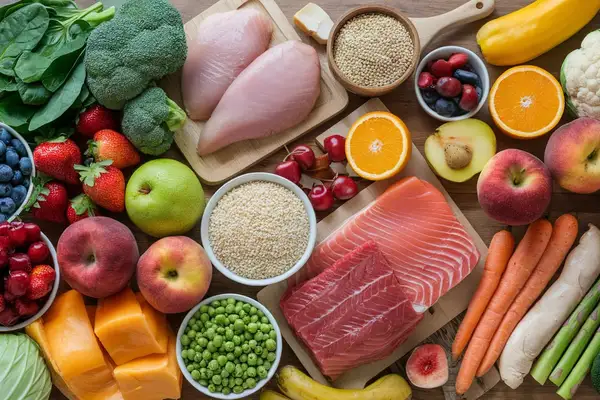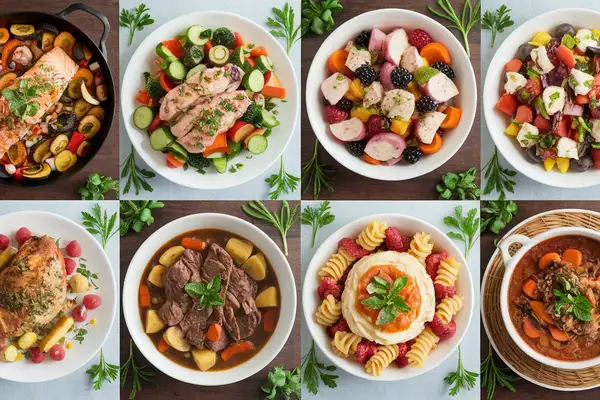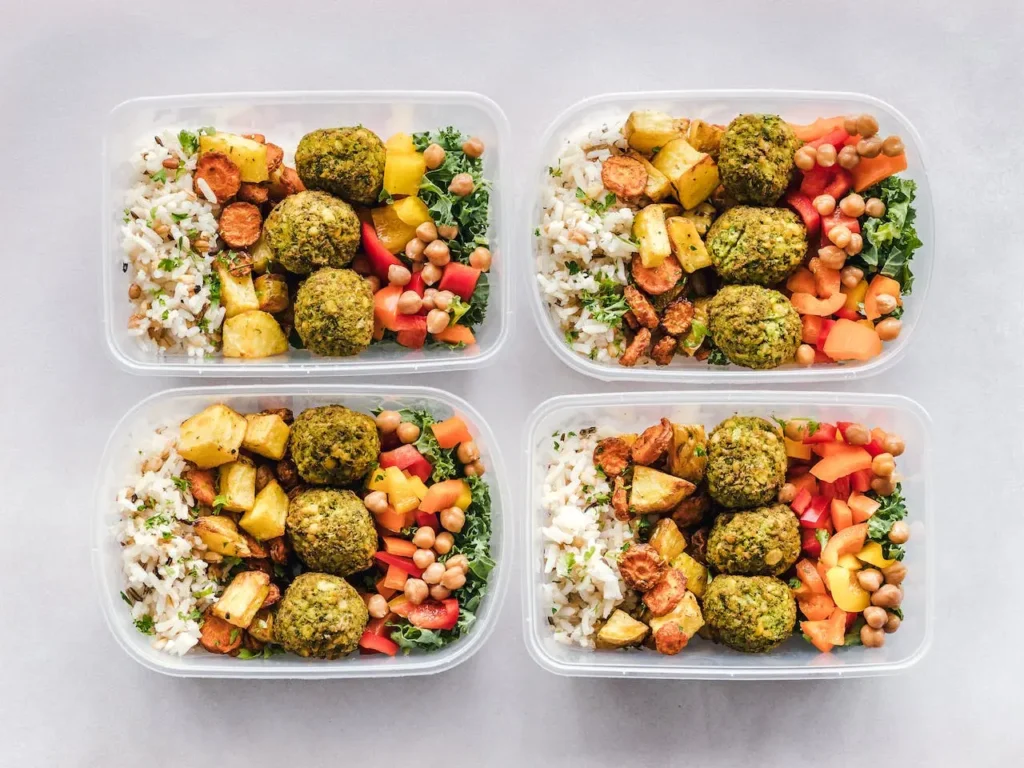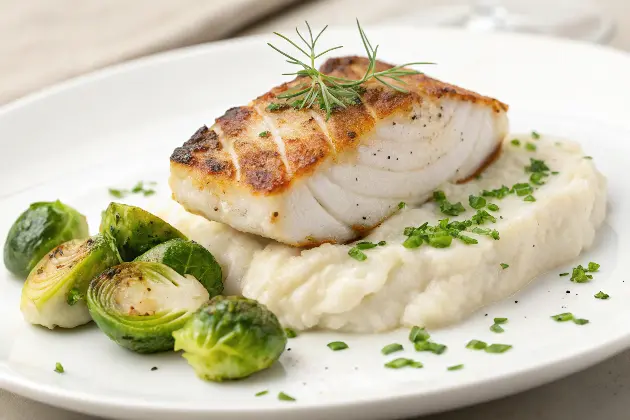7-Day Meal Plan for Rheumatoid Arthritis: Foods to Eat & Avoid
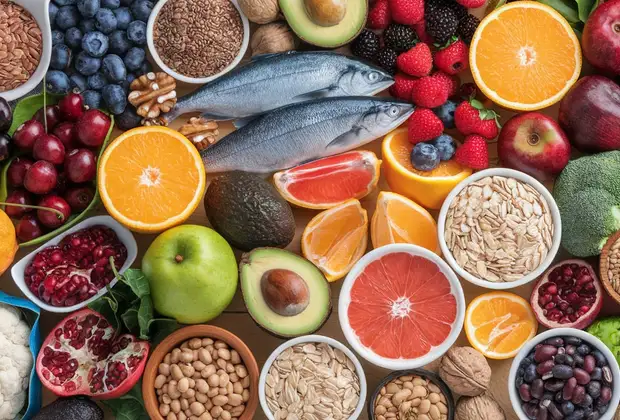
What is Rheumatoid Arthritis?
This post may contain affiliate links, meaning I may earn a commission if you make a purchase, at no extra cost to you. I only recommend products I trust. Thank you for your support.
Rheumatoid arthritis is an autoimmune disease that causes inflammation in your joints. It can lead to pain, stiffness, and swelling, typically affecting smaller joints like those in your hands and feet first.
But here’s the kicker, it’s not just about joints. Rheumatoid arthritis can affect other parts of your body too, like your skin, eyes, and lungs.
Living with rheumatoid arthritis can be challenging, especially when it comes to managing the symptoms of pain, stiffness, and inflammation.
While there’s no cure, following an anti inflammatory diet for arthritis can help reduce flare ups and improve quality of life.
But did you know that the foods you eat can have a significant impact on how you feel? A well-planned rheumatoid arthritis diet plan can help reduce inflammation, boost energy, and manage symptoms.
This 7-Day Meal Plan for Rheumatoid Arthritis is packed with anti-inflammation foods, nutrient-dense ingredients, and easy recipes for rheumatoid arthritis tailored to help you manage your symptoms while enjoying a variety of tasty, wholesome meals.
Rheumatoid Arthritis Symptoms
Some common rheumatoid arthritis symptoms include:
- Joint pain: Aching or tenderness in joints, especially in the fingers, wrists, knees, and ankles.
- Swelling: Joints may become swollen, which can cause stiffness and discomfort.
- Stiffness: Often worse in the morning or after periods of inactivity (commonly referred to as “morning stiffness”).
- Fatigue: A general feeling of tiredness or lack of energy, even without exertion.
- Warm or red joints: Inflamed joints may feel warm to the touch or appear red.
- Joint deformity: Over time, chronic inflammation can cause permanent joint damage and deformities.
- Fever: Mild fevers may occur during flare-ups.
- Loss of joint function: In advanced cases, joints may lose their range of motion, making everyday tasks difficult.
- Symmetrical symptoms: Rheumatoid arthritis often affects the same joints on both sides of the body.
- Weight loss: Unexplained weight loss can occur in some individuals due to the body’s inflammatory response.
The Best Foods for Rheumatoid Arthritis
These foods are packed with nutrients that support joint function and help alleviate symptoms associated with rheumatoid arthritis.
Here are some of the recommended foods to eat with rheumatoid arthritis:
1. Omega-3 Rich Foods
Omega-3 fatty acids have strong anti-inflammatory properties that can help reduce joint pain and stiffness in people with rheumatoid arthritis.
- Fatty fish (e.g., salmon, mackerel, sardines, tuna)
- Flaxseeds
- Chia seeds
- Walnuts
- Algal oil (plant-based omega-3 option)
2. Antioxidant-Rich Fruits
Fruits rich in antioxidants, especially vitamin C, can help protect the body from oxidative stress and inflammation caused by rheumatoid arthritis.
- Berries (e.g., blueberries, strawberries, raspberries, blackberries)
- Citrus fruits (e.g., oranges, grapefruits, lemons)
- Cherries
- Apples
- Mangoes
- Pomegranates
- Kiwi
- Pineapple
3. Leafy Greens and Cruciferous Vegetables
These vegetables are high in vitamins and minerals that reduce inflammation and promote bone health.
- Spinach
- Kale
- Swiss chard
- Broccoli
- Brussels sprouts
- Cauliflower
- Cabbage
4. Whole Grains
Whole grains are rich in fiber and other nutrients that help fight inflammation, making them a better option than refined grains.
- Quinoa
- Brown rice
- Oats
- Barley
- Buckwheat
- Millet
5. Healthy Fats
Healthy fats, particularly monounsaturated fats and omega-3s, help reduce inflammation and support joint health.
- Olive oil (extra virgin)
- Avocados
- Coconut oil (in moderation)
- Nuts (almonds, walnuts, pecans)
6. Plant-Based Proteins
Plant-based proteins are a great option for those looking to reduce inflammation without consuming too much animal protein.
- Lentils
- Chickpeas
- Black beans
- Tofu
- Tempeh
- Edamame
7. Spices and Herbs with Anti-Inflammatory Properties
Certain spices and herbs are known for their powerful anti-inflammatory effects, which can benefit individuals with rheumatoid arthritis.
- Turmeric (curcumin is the active compound)
- Ginger
- Garlic
- Cinnamon
- Rosemary
- Thyme
- Cayenne pepper
8. Fermented Foods
Probiotics in fermented foods can help balance gut health, which plays a role in reducing inflammation.
- Yogurt (preferably Greek and unsweetened)
- Kefir
- Sauerkraut
- Kimchi
- Miso
9. Legumes
Legumes provide fiber, protein, and a variety of vitamins and minerals that help fight inflammation and promote overall health.
- Lentils
- Black beans
- Chickpeas
- Kidney beans
- Peas
10. Low-Fat Dairy or Dairy Alternatives
For those who tolerate dairy, low-fat options can provide calcium and vitamin D, essential for bone health. For those who prefer dairy-free options, alternatives can be equally beneficial.
- Low-fat milk
- Low-fat yogurt
- Almond milk
- Oat milk
- Fortified soy milk
11. Anti-Inflammatory Drinks
Certain drinks can provide anti-inflammatory benefits and help with hydration, which is important for overall joint health.
- Green tea
- Turmeric tea
- Ginger tea
- Herbal teas (e.g., chamomile, peppermint)
- Water with lemon
- Bone broth
12. Root Vegetables
Root vegetables are rich in nutrients and antioxidants that support immune health and reduce inflammation.
- Sweet potatoes
- Carrots
- Beets
- Turnips
- Squash
13. Lean Poultry
Lean poultry offers high-quality protein with less saturated fat, making it a good choice for joint health.
- Chicken
- Turkey
- Eggs
14. Shellfish
Shellfish are rich in glucosamine, a compound known to support joint health by aiding in the repair of cartilage and reducing inflammation, making it beneficial for people with rheumatoid arthritis and osteoarthritis
- Shrimp
- Lobster
- Crab
- Clams
- Oysters
- Scallops
- Mussels
Foods to Avoid with Arthritis
Certain foods can trigger inflammation, worsen joint pain, and potentially exacerbate arthritis symptoms.
Below is a categorized list of the foods that people with rheumatoid arthritis should avoid or limit to reduce inflammation and maintain better joint health.
1. Processed and Fried Foods
Processed and fried foods often contain trans fats and other unhealthy ingredients that can promote inflammation and worsen arthritis symptoms.
- Fast food (e.g., burgers, fries, chicken nuggets)
- Packaged snacks (e.g., chips, crackers, pretzels)
- Frozen meals (e.g., frozen pizzas, TV dinners)
- Deep-fried items (e.g., fried chicken, onion rings, donuts)
2. Sugary Foods and Beverages
High sugar intake can trigger the release of inflammatory messengers called cytokines, which can worsen arthritis-related inflammation and pain.
- Soda and soft drinks
- Candy
- Pastries (e.g., donuts, cookies, cakes)
- Sugary cereals
- Sweetened coffee drinks (e.g., flavored lattes, frappuccinos)
- Fruit juices with added sugars
3. Refined Carbohydrates
Studies show that refined carbs can cause blood sugar spikes and promote inflammation, which can exacerbate arthritis symptoms.
- White bread
- White rice
- Pasta made from refined flour
- Pastries and cakes made with white flour
- Processed snack foods (e.g., crackers, baked goods)
4. Red and Processed Meats
Red and processed meats are rich in saturated fats can contribute to inflammation in the body and worsen arthritis symptoms.
- Beef
- Pork
- Lamb
- Bacon
- Sausages
- Hot dogs
- Deli meats
- Salami
5. Full-Fat Dairy Products
For some people with arthritis, full-fat dairy can trigger inflammation due to its saturated fat content. While dairy is a good source of calcium and vitamin D, full-fat options can contribute to joint pain.
- Whole milk
- Full-fat yogurt
- Cheese (especially processed cheese)
- Butter
- Cream
6. Omega-6 Fatty Acids
While omega-6 fatty acids are essential in moderation, consuming too many can promote inflammation. These fats are found in many oils and processed foods.
- Vegetable oils (e.g., corn oil, sunflower oil, soybean oil)
- Mayonnaise
- Salad dressings (store-bought)
- Processed baked goods (e.g., cookies, cakes)
- Certain snack foods (e.g., crackers, chips)
7. Alcohol
Excessive alcohol consumption can increase inflammation and worsen arthritis symptoms. Alcohol can also interfere with medications used to treat rheumatoid arthritis.
- Beer
- Wine (in excess)
- Spirits (vodka, whiskey, etc.)
8. High-Sodium Foods
Consuming too much salt can increase water retention, leading to joint swelling and discomfort in people with arthritis. A low-sodium diet can help manage inflammation.
- Canned soups
- Processed foods (e.g., deli meats, bacon)
- Packaged meals
- Fast food
- Pre-made sauces and marinades
- Salted snacks (e.g., potato chips, salted nuts)
9. Gluten-Containing Foods
Some people with arthritis, especially those with gluten sensitivity or celiac disease, may experience increased inflammation when consuming gluten.
While gluten may not cause issues for everyone with arthritis, those who are sensitive should avoid it and adopt a gluten free diet.
- Wheat-based breads
- Pasta made from wheat
- Barley
- Rye
- Certain cereals (check labels for gluten content)
- Baked goods made with gluten-containing flour
10. Foods Containing Advanced Glycation End Products (AGEs)
Advanced glycation end products are harmful compounds formed when proteins or fats combine with sugar.
They are naturally present in many foods, especially those that are cooked at high temperatures and can trigger inflammation in people with arthritis.
- Grilled or seared meats
- Fried foods
- Processed meats (e.g., bacon, sausage)
- Cheese (especially processed varieties)
- Butter
- Margarine
Free 7-Day Meal Plan for Rheumatoid Arthritis
This 7-day meal plan for rheumatoid arthritis features easy recipes and meal ideas that are rich in anti inflammatory ingredients, aimed at reducing joint pain.
This rheumatoid arthritis diet plan not only focuses on reducing joint pain but also offers a variety of flavorful, easy recipes for rheumatoid arthritis ideas that support overall health.
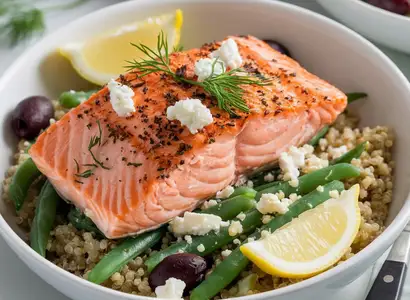
Day 1
Breakfast:
- Spinach and Mushroom Omelet: Sauté spinach and mushrooms in olive oil. Pour whisked eggs over vegetables and cook until set. (2 eggs, 1 cup spinach, 1/2 cup mushrooms)
Lunch:
- Grilled Shrimp Salad with Kale: Grill shrimp, then toss with kale, cooked quinoa, shredded carrots, and a lemon vinaigrette. (4 oz shrimp, 1 cup kale, 1/4 cup quinoa, 1/4 cup carrots)
Dinner:
- Baked Salmon & Quinoa Bowls with Green Beans: Grill the salmon until cooked through. Serve over cooked quinoa with steamed green beans, Kalamata olives, and crumbled feta. (4 oz salmon, 1/2 cup quinoa, 1/2 cup green beans, 1/4 cup olives, 2 tbsp feta)
Snacks:
- Crudités with Herb and Garlic Yogurt Dip: Serve fresh veggies like carrots and cucumbers with a dip made from Greek yogurt, garlic, and herbs. (Carrots, cucumbers, 1/4 cup Greek yogurt, garlic, herbs)
- Apple Slices with Almond Butter: Slice an apple and serve with almond butter for a quick snack. (1 apple, 2 tbsp almond butter)
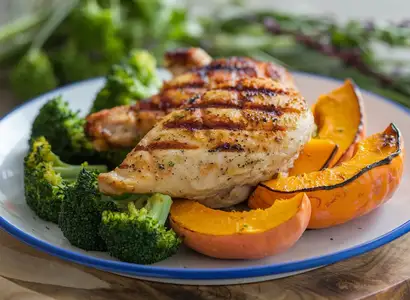
Day 2
Breakfast:
- Cocoa Cherry Oatmeal: Cook oats with water or almond milk, mix in unsweetened cocoa, and top with fresh cherries and a drizzle of honey. (1/2 cup oats, 1 tbsp cocoa powder, 1/4 cup cherries)
Lunch:
- Lentil and Vegetable Stew: Cook lentils with carrots, turnips, and kale in vegetable broth until tender. Serve with brown rice. (1 cup lentils, 1/2 cup carrots, 1/2 cup turnips, 1/2 cup kale, 1/2 cup brown rice)
- Chopped Veggie Grain Bowls with Turmeric Dressing: Cook quinoa or farro, toss with chopped veggies like cucumbers, tomatoes, and carrots, and drizzle with a turmeric-based dressing. (1/2 cup quinoa, 1/2 cup mixed veggies, 1 tbsp turmeric dressing)
Dinner:
- Grilled Chicken with Roasted Squash: Grill seasoned chicken breast and serve with roasted butternut squash and sautéed broccoli. (6 oz chicken, 1/2 cup squash, 1/2 cup broccoli)
Snacks:
- Roasted Eggplant Dip with Crackers: Roast eggplant, blend with garlic and olive oil, and serve with whole-grain crackers. (1/2 eggplant, 1 tbsp olive oil, garlic, crackers)
- Blueberries & Almonds: A handful of fresh blueberries and almonds make a refreshing, anti-inflammatory snack. (1/2 cup blueberries, 1/4 cup almonds)
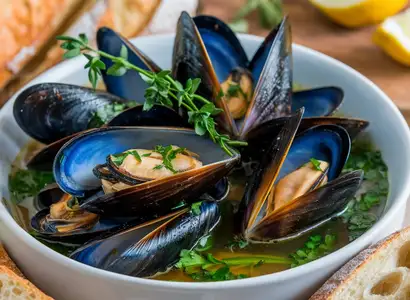
Day 3
Breakfast:
- Açai Bowl: Blend açai puree with almond milk, and top with granola, chia seeds, and fresh mixed berries. (1 packet açai, 1/2 cup almond milk, 1/4 cup granola, 1 tbsp chia seeds)
Lunch:
- Tofu and Black Bean Stir-Fry: Stir-fry tofu, black beans, broccoli, and Swiss chard. Serve over brown rice. (4 oz tofu, 1/2 cup black beans, 1/2 cup broccoli, 1/2 cup Swiss chard, 1/2 cup brown rice)
Dinner:
- Mussels in Garlic Herb Broth: Steam mussels in a broth of garlic, herbs, and olive oil. Serve with steamed cauliflower and quinoa. (6 oz mussels, 1/2 cup cauliflower, 1/2 cup quinoa)
Snacks:
- Date and Blueberry Tarts: Make mini tarts with a whole grain crust, topped with dates and fresh blueberries. (Whole grain tart crust, 1/4 cup dates, 1/4 cup blueberries)
- Rustic Apple-Cranberry Galette: A small, rustic whole-grain galette filled with sliced apples and cranberries. (Whole grain crust, 1 apple, 1/4 cup cranberries)
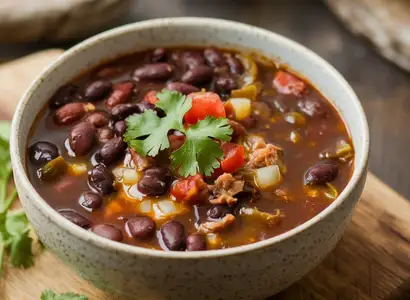
Day 4
Breakfast:
- Baked Eggs Provencale: Eggs baked in a tomato, garlic, and herb sauce, served with whole grain toast. (2 eggs, 1/2 cup tomato sauce, garlic, herbs, 1 slice whole grain toast)
Lunch:
- Lemon Herb Chicken with Roasted Vegetables: Marinate chicken in lemon and herbs, then roast with carrots, sweet potatoes, and parsnips. (6 oz chicken, 1/2 lemon, herbs, 1/2 cup roasted veggies)
Dinner:
- Chipotle Black Bean Soup: A warming bowl of black bean soup spiced with chipotle, served with a side of whole grain toast. (1/2 cup black beans, 1/4 tsp chipotle powder, 1 slice whole grain toast)
- Mediterranean Tuna Salad on a Bed of Greens: Mix tuna with olive oil, lemon juice, and capers, and serve over mixed greens. (4 oz tuna, 1 tbsp olive oil, 1 tbsp capers, 2 cups greens)
Snacks:
- Roasted Pumpkin Apple Soup: Blend roasted pumpkin and apples into a soup with warm spices like cinnamon. (1/2 cup pumpkin, 1 apple, cinnamon, nutmeg)
- Handful of Walnuts and Dark Chocolate: Enjoy a small handful of walnuts and a square of dark chocolate for a satisfying snack. (1/4 cup walnuts, 1 square dark chocolate)
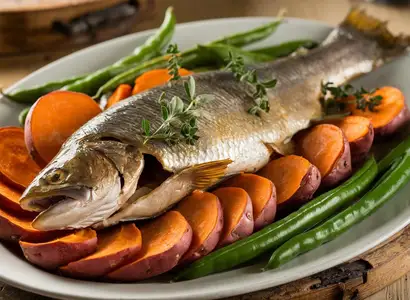
Day 5
Breakfast:
- Open-Faced Eggs Florentine Sandwich: Toast whole grain bread and top with wilted spinach, poached eggs, and a sprinkle of black pepper. (2 eggs, 1 cup spinach, 1 slice whole grain bread)
Lunch:
- Spanish-Style Brown Rice with Grilled Chorizo and Peppers: Cook brown rice with grilled chorizo, bell peppers, and a dash of smoked paprika. (1/2 cup brown rice, 2 oz chorizo, 1/2 bell pepper)
Dinner:
- Baked Trout with Roasted Sweet Potato and Steamed Green Beans: Bake trout fillets with olive oil and serve with roasted sweet potato and steamed green beans. (4 oz trout, 1/2 sweet potato, 1/2 cup green beans)
- Spicy Chicken Sweet Potato Stew: Cook chicken and sweet potatoes with warm spices like cumin and paprika for a hearty breakfast stew. (4 oz chicken, 1/2 sweet potato, cumin, paprika)
Snacks:
- Orange Pickled Fennel: Thinly slice fennel and marinate in orange juice and vinegar for a light snack. (1/2 fennel bulb, 1/4 cup orange juice, 1 tbsp vinegar)
- Chia Pudding with Fresh Raspberries: Chia seeds soaked in almond milk, and topped with fresh raspberries. (1/4 cup chia seeds, 1/2 cup almond milk, 1/4 cup raspberries)
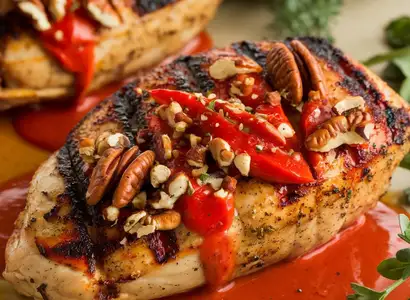
Day 6
Breakfast:
- Scrambled Eggs with Swiss Chard: Scramble eggs with sautéed Swiss chard and garlic. Serve with citrus fruit slices. (2 eggs, 1 cup Swiss chard, 1 clove garlic, 1/2 orange)
Lunch:
- Grilled Chicken with Red Pepper-Pecan Romesco Sauce: Grill chicken breast and top with a savory Romesco sauce made from roasted red peppers, pecans, and garlic. Serve with a side of steamed green beans. (4 oz chicken breast, 1/4 cup roasted red peppers, 2 tbsp pecans, 1/2 cup green beans)
Dinner:
- Roasted Soy-Ginger Salmon and Broccoli: Marinate salmon in soy sauce and ginger, then roast alongside broccoli. Serve with a side of brown rice. (4 oz salmon, 1 tbsp soy sauce, 1/2 tsp ginger, 1/2 cup broccoli)
- Kale & Avocado Salad with Blueberries & Edamame: Massage kale with olive oil and lemon juice, then toss with avocado slices, fresh blueberries, and edamame. (2 cups kale, 1/2 avocado, 1/4 cup blueberries, 1/4 cup edamame)
Snacks:
- Roasted Pumpkin Apple Soup: A comforting soup made by roasting pumpkin and apples and blending with warm spices like cinnamon. (1/2 cup pumpkin, 1 apple, cinnamon, nutmeg)
- Pomegranate Seeds and a Handful of Walnuts: Snack on antioxidant-packed pomegranate seeds and a handful of walnuts. (1/4 cup pomegranate seeds, 1/4 cup walnuts)
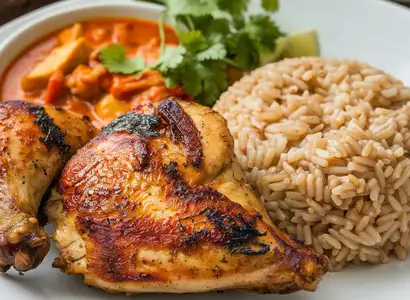
Day 7
Breakfast:
- Whipped Squash with Honey and Spice: Roast butternut squash, then whip with honey, cinnamon, and nutmeg for a warm and sweet breakfast. (1/2 cup roasted squash, 1 tsp honey, cinnamon, nutmeg)
Lunch:
- Bone Broth Soup with Chicken: Simmer chicken, sweet potatoes, carrots, and turnips in a rich bone broth, seasoned with garlic and herbs. (1 cup bone broth, 4 oz chicken, 1/2 cup sweet potatoes, 1/2 cup carrots, 1/2 cup turnips)
- Chickpea and Carrot Salad: Roast beets and toss with chickpeas, shredded carrots, and fresh spinach, then drizzle with a tangy lemon-ginger dressing. (1/2 cup chickpeas, 1/2 cup roasted beets, 1/2 cup spinach, 1/2 cup carrots, lemon-ginger dressing)
Dinner:
- Red Thai Chicken Curry With Brown Rice: Simmer chicken in a creamy red Thai curry sauce with coconut milk, and serve over brown rice with a side of steamed broccoli. (4 oz chicken, 1/2 cup coconut milk, 1 tbsp red curry paste, 1/2 cup brown rice)
Snacks:
- Green Tea with a Handful of Berries: Sip on green tea paired with antioxidant-rich berries. (1 cup green tea, 1/2 cup mixed berries)
- Citrus Fruits and Mango: Enjoy a refreshing mix of sliced oranges and mangoes for a sweet snack. (1/2 orange, 1/2 mango)
Diet Tips for People With Rheumatoid Arthritis
- Focus on Anti-Inflammatory Foods: Incorporate foods rich in omega-3 fatty acids, such as salmon, flaxseeds, and walnuts, to help reduce inflammation in the joints.
- Eat Plenty of Fruits and Vegetables: Opt for a variety of colorful fruits and vegetables like berries, spinach, kale, and broccoli. These are packed with antioxidants that help fight inflammation and support immune function.
- Choose Lean Proteins: Include lean protein sources like chicken and tofu, which are less likely to promote inflammation compared to red meat. Fatty fish like salmon and sardines are also excellent choices due to their omega-3 content.
- Limit Processed Foods: Avoid processed foods high in refined sugars, unhealthy fats, and additives, as they can contribute to inflammation and weight gain, which may put more stress on the joints.
- Maintain a Healthy Weight: Excess weight can worsen inflammation and increase joint pain. Adopting a low-calorie diet while staying active can help achieve and maintain an optimal weight for rheumatoid arthritis management.
- Stay Hydrated: Drinking plenty of water and herbal teas like turmeric or ginger tea can help flush out toxins, reduce joint stiffness, and support overall health.
- Consider Eliminating Potential Trigger Foods: Some people find relief by avoiding nightshade vegetables (tomatoes, peppers, eggplants) or dairy.
- Add Spices That Fight Inflammation: Season your meals with anti-inflammatory spices like turmeric, ginger, garlic, and cinnamon. These not only add flavor but also help reduce inflammation in the body.
- Cook smart: Opt for healthier cooking methods such as grilling, steaming, and baking instead of frying. Avoid using excessive oils and fats that can contribute to inflammation.
- Eat a Mediterranean-style Diet: A Mediterranean diet is naturally anti-inflammatory and is packed with antioxidants and healthy fats that are beneficial for joint function.
- Limit Alcohol and Caffeine: Alcohol and excessive caffeine consumption can trigger inflammation and interact with medications for rheumatoid arthritis. It’s best to consume these in moderation or avoid them altogether.
- Consider Vitamin D and Calcium-Rich Foods: People with rheumatoid arthritis may have a higher risk of osteoporosis. Include calcium and vitamin D-rich foods like fortified plant-based milks, leafy greens, and fatty fish to support bone health.
Summary
This 7-day rheumatoid arthritis diet plan is designed to help reduce inflammation and provide your body with the nutrients it needs to thrive.
Remember, everyone’s body is different, so what works for one person might not work for another. It’s always a good idea to keep a food diary and note how different foods affect your rheumatoid arthritis symptoms.
And of course, always consult with your healthcare provider or a registered dietitian before making significant changes to your diet.
By focusing on anti inflammation foods and avoiding those that may trigger inflammation, you’re taking an important step in managing your rheumatoid arthritis.
Combined with your medical treatment plan, a healthy rheumatoid arthritis diet can help you feel your best and live life to the fullest.
- 7 day gallbladder diet menu
- Iron rich diet for anemia
- Brain health diet; Mediterranean DASH Diet Plan
- 7-day meal plan for type 2 diabetes
- What to eat on a no sugar diet
- 7-day oatmeal diet for weight loss
- 7-day high protein diet plan for weight loss
- 25 foods to lower triglycerides naturally
- How to eat clean for beginners
FAQs
What drink is good for rheumatoid arthritis?
Green tea is an excellent choice for people with rheumatoid arthritis. It’s rich in polyphenols, particularly a compound called epigallocatechin 3-gallate (EGCG), which has powerful anti-inflammatory effects. Other good options include turmeric tea, ginger tea, and tart cherry juice.
Is banana good for rheumatoid arthritis?
Yes, bananas are good for rheumatoid arthritis. They’re a good source of potassium, which helps reduce fluid retention, a common problem for people with arthritis.
What are the 10 foods that fight arthritis?
Ten foods that fight arthritis include salmon, spinach, berries, walnuts, olive oil, chia seeds, turmeric, garlic, oranges, and green tea.
Is milk good for arthritis?
The effects of milk on arthritis can vary. Some studies suggest that dairy might increase inflammation, while others indicate it could have anti-inflammatory effects. If you’re unsure, consider trying almond or oat milk instead.
Are eggs OK for rheumatoid arthritis?
Yes, eggs are okay for rheumatoid arthritis. They’re a good source of protein and contain vitamin D, which is important for bone health.
